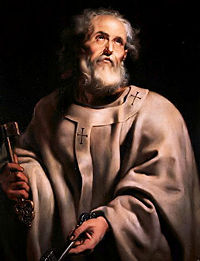The Pope and the Patriarch
Bartholomew invites Pope Francis to meet next year.
Ecumenical Patriarch Bartholomew said March 20 he hopes he and Pope Francis can meet in Jerusalem to mark the 50th anniversary of the famous embrace in 1964 between their predecessors, Paul VI and Patriarch Athenagoras.
The Orthodox leader invited the Holy Father to the Holy Land in a private audience a day after he made history by becoming the first ecumenical patriarch to attend a papal inauguration in over a millennium.
The meeting between Paul VI and Athenagoras in Jerusalem in 1964 resulted in the mutual lifting of the anathemas that had separated Orthodox and Catholics since 1054. The symbolic gesture opened the possibility of authentic dialogue between the two Churches for the first time in centuries.
If Pope Francis were to visit Jerusalem in 2014, it would also mark the fifth anniversary of Benedict XVI’s visit to the Holy Land.
Shortly after their morning meeting, the Pope and the Patriarch met at a gathering of ecumenical and interreligious leaders in the Clementine Hall. During the meeting, Pope Francis pledged his commitment to the "noble task" of ecumenical dialogue; reaffirmed his commitment to continue a "fruitful fraternal dialogue" with Jews; and expressed a desire to pursue "reciprocal trust" with Muslims.
In an indication of how future ecumenical and interreligious relations with the new Pope might develop, the warmth and cordiality Pope Francis showed the delegates was clear throughout the meeting, and the Holy Father and Jewish and Muslim representatives from Argentina greeted each other like dear old friends.
‘Fraternal Delegates’
Addressing the "fraternal delegates," all of whom had attended the Pope’s inaugural Mass the day before, the Holy Father first listened to a greeting from the Ecumenical Patriarch.
Bartholomew noted the "elevated, serious and difficult task" of the Petrine ministry. He also reiterated the need for the Churches to shun worldly distractions and to work on the unity between Christians. And he made a point of thanking Pope Francis for his "long and valued ministry as a Good Samaritan in Latin America."
Pope Francis, who sat in an armchair rather than the throne usually reserved for the pope, immediately established a fraternal tone by thanking "my brother Andrew" for his greeting, a reference to the Patriarch’s representation of the patron saint of Constantinople. He expressed his gratitude for the prayerful support of all those present.
The Holy Father stressed that "the more we are faithful to [God’s] will, in thoughts, in words and in deeds, the more we will truly and substantially walk towards unity." And he assured the Christian and ecumenical leaders of his "firm wish" to continue on the path of ecumenical dialogue.
Turning his attention to the Jewish leaders present, the Holy Father said the Church and the Jewish religion "are bound by a very special spiritual bond." He thanked them for their presence and for their trust to continue "that fruitful fraternal dialogue" wished for by the Second Vatican Council. Such a dialogue has, in fact, been achieved, he noted, "bringing many fruits, especially during the last decades."
Lastly, he spoke to representatives of other religions, beginning with the Muslims present. He assured them of the determination of the Catholic Church to work cooperatively for the good of mankind. "I really appreciate your presence, and in it I see a tangible sign of the wish to grow in reciprocal trust and in cooperation for the common good of humanity," he said.
During his address, the Pope expressed his support for the Year of Faith, saying he hoped it "will be an inspiration for everyone’s journey of faith." He also made a point of emphasizing that the Church greatly values its ties with non-Catholics.
The Church, he said, "is aware of the importance of the promotion of friendship and respect between men and women of different religious traditions," and he repeated the sentence to add emphasis. He also returned to the theme of his inaugural Mass homily: to love and protect.
"We can do a lot for the good of the less fortunate, for those who are weak and suffering, to promote justice, to promote reconciliation, to build peace," he said. "But, above all, we must keep alive in our world the thirst for the Absolute and must not allow the vision of the human person with a single dimension to prevail, according to which man is reduced to what he produces and to what he consumes: This is one of the most dangerous threats of our times."
The Pope recalled how much violence has been provoked in recent history "by the attempt to eliminate God and the divine from the horizon of humanity, and we feel the need to witness in our societies the original openness to transcendence that is inherent in the human heart."
"In this, we feel the closeness also of those men and women who, while not belonging to any religious tradition, feel, however, the need to search for the truth, the goodness and the beauty of God," he said. They are "our precious allies in efforts to defend the dignity of man, in the building of a peaceful coexistence between peoples and in the careful protection of creation."
Edward Pentin writes from Rome.
- Keywords:
- April 7-20, 2013


















